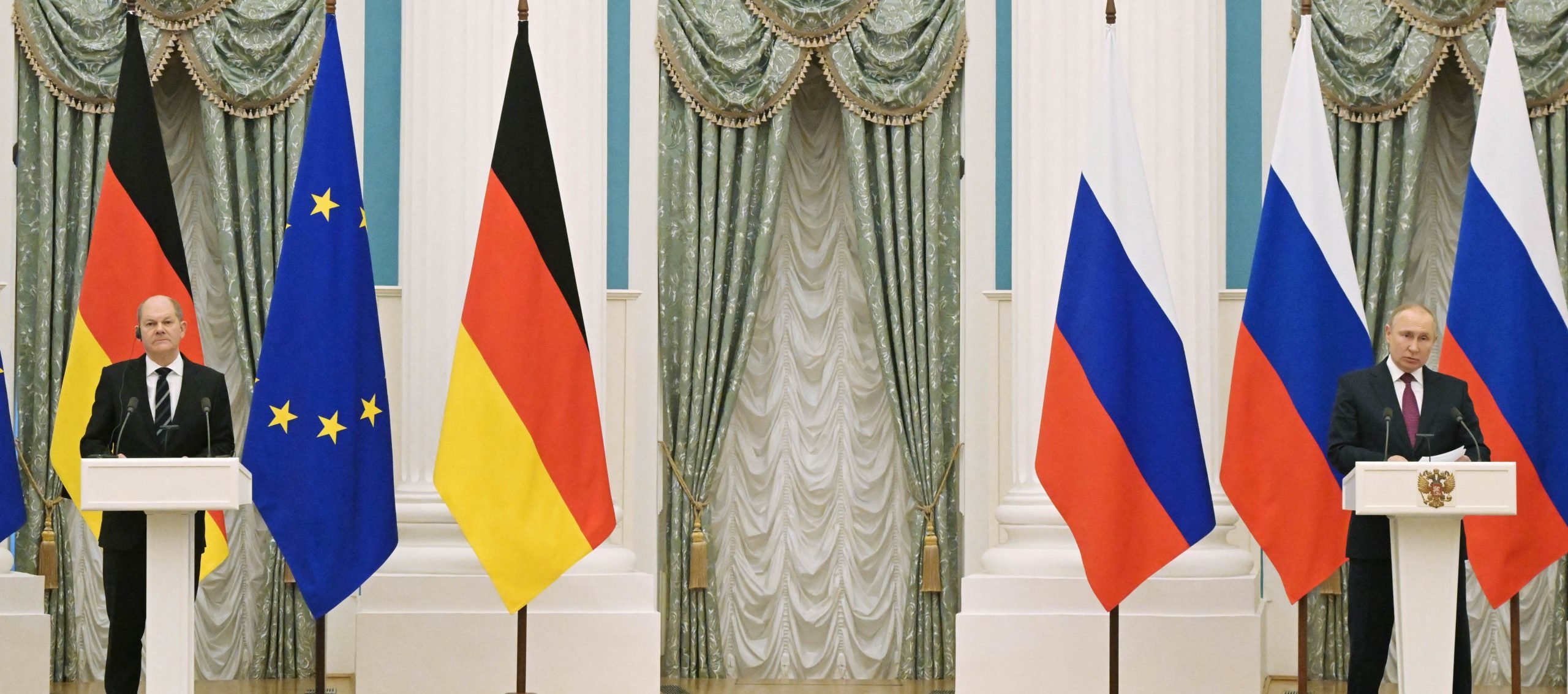“As for the pipeline, everyone knows what the situation is,” said German chancellor Olaf Scholz in his joint press conference with Russian president Vladimir Putin yesterday afternoon. In contrast to his visibly uncomfortable appearance in Washington, the trip to Moscow showcased a more assertive Scholz. At times the usually reserved chancellor even became a little emotional, telling his Russian counterpart that it was “our damn duty” to prevent war. He even mentioned Nord Stream 2 once — and got away with it.
It certainly looked as if Russia was opening the doors to a diplomatic solution. Their announcement of some troop withdrawals from the Ukrainian border was welcomed by Scholz as a “good sign,” but he also expressed hope that ‘more will follow’. NATO chief Jens Stoltenberg also expressed “cautious optimism”.
In contrast to his hesitancy in Washington, Scholz in Moscow was much clearer and began to draw at least the contours of a line in the sand. He stated that he could not see “any reasonable justification” for the Russian troop build-up and that he considered the integrity of the borders of Ukraine “inviolable”. An invasion would have “grave political, economic and geo-strategic consequences for Russia”. This was the closest the chancellor had yet come to an outright threat to Moscow.
Scholz also attempted to lay out a diplomatic path out of the crisis. He insisted that both Russia and Ukraine must stick to the so-called Minsk accords which were brokered by Germany and France after the annexation of Crimea in 2014 and 2015. The 13 points of Misk II are particularly contentious as they demand devolution of power to (and separate elections in) the contested regions of Donetsk and Luhansk. In addition, the accords calls for an amnesty for everyone involved in the bloody conflict there, including Russian-backed rebels and mercenaries.
The required changes to the Ukrainian constitution have not happened yet as Kyiv fears the regions would effectively become a Trojan horse for Russian influence within Ukraine. Scholz attempted to assure Putin that he would press Ukraine on this, but that all sides would have to stick to it.
Scholz also attempted to assure Putin regarding Ukrainian NATO membership. But he could not help adding a little sting in the tail when he said that membership was not on the cards within both of their times in office, “although I don’t know how long the president intends to stay in office. I have a feeling for a little while yet but certainly not forever.”
If Scholz was more assertive, Putin returned the fire. The Russian president wants nothing less than written confirmation that Ukraine will never join NATO, control over arms stationed near its borders and the reduction of NATO’s military infrastructure to 1997 levels. Russia’s parliament, the Duma, has also passed a resolution for Putin to recognise Donetsk and Luhansk as independent republics.
He also called the West’s answers to Russian proposals “unacceptable” and said that NATO caused the last European war themselves with “bombs on Belgrade”. When Scholz retorted that the 1999 bombings of Yugoslavia had prevented genocide, Putin shot back, “What is happening in the Donbas is genocide.”
Domestic and foreign pressure have finally woken Scholz from his political slumber. His performance in Moscow yesterday was more sure-footed than anything we have seen from him so far. One can assume that direct and extensive talks with Putin have also opened his eyes to the fact that it will take more than good intentions to de-escalate the situation in Ukraine.
Scholz says that “the potential for diplomacy is far from exhausted”, but it remains to be seen if he is willing to tap into the full political arsenal available to a country better placed than most to tighten the screws on Moscow.











Join the discussion
Join like minded readers that support our journalism by becoming a paid subscriber
To join the discussion in the comments, become a paid subscriber.
Join like minded readers that support our journalism, read unlimited articles and enjoy other subscriber-only benefits.
Subscribe